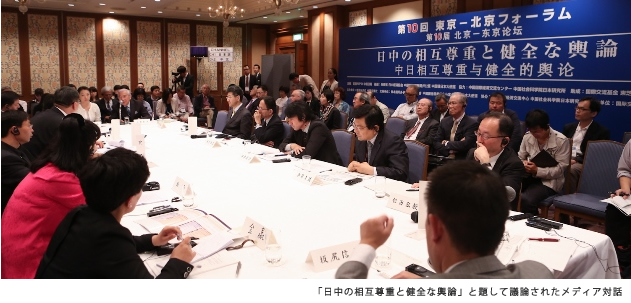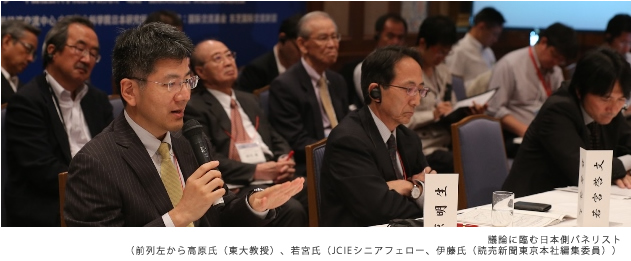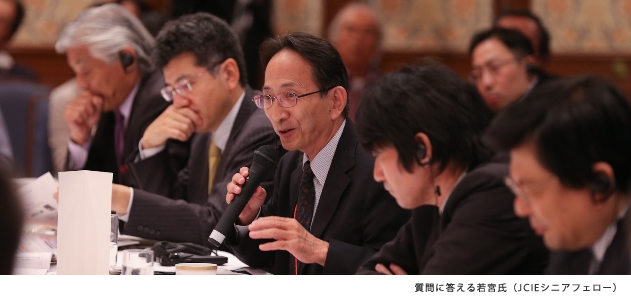
Journalists and media experts from Japan and China gathered to discuss the role the media plays in the relationship between the two neighboring countries during the sub-session on media-related issues, held Sept. 28 during the 10th Tokyo-Beijing Forum. Nine panelists from Japan and six from China exchanged views on the sub-session's theme, "Mutual Respect between Japan and China, and Healthy Public Opinion."
Yasushi Kudo, president of The Genron NPO, kicked off the discussion by sharing the results of the 10th Japan-China joint opinion poll, which noted that while negative sentiment toward Japan by the Chinese was influenced by the political climate of the time, negative sentiment toward China by the Japanese has been on a steady decline regardless of the political environment. While acknowledging the need to improve such negative relations, people are having difficulty envisioning the importance of the ties amid failing political relations in light of the Senkaku/Diaoyu Islands dispute and controversies surrounding interpretations of modern history between the two nations, Kudo said.
Jin Ying from the Institute of Japanese Studies of the Chinese Academy of Social Sciences (CASS) then presented the Chinese point of view, where she pointed out that aside from the usual controversies that strain bilateral ties, the efforts of the administration of Prime Minister Shinzo Abe to form an "anti-China" league with surrounding nations have fueled negative feelings toward Japan and that the media to some extent has played a role in encouraging such negativity.

In the panel discussion that followed, Yoshibumi Wakamiya, a senior fellow at the Japan Center for International Exchange and a former editor in chief at the Asahi Shimbun newspaper, pointed out that the rise of negative sentiment toward China among the Japanese appears to stem not from politics but from issues affecting daily life such as food safety and air pollution.
Kazuo Ogoura, a former ambassador to South Korea and France, and currently advisor to the Japan Foundation, added that negative sentiments among the Chinese, on the other hand, appear to stem from more conceptual issues like politics and territory.
Commenting on this year's survey, Ogoura also found it odd to find that fewer Chinese harbored negative sentiments toward Japan despite Prime Minister Abe's visit to Yasukuni Shrine, to which Jin responded that fewer Chinese feel the Yasukuni issue is a bilateral one, as the United States, South Korea and other Asian nations have been similarly criticizing Abe's visit to the controversial shrine.
On the topic of "mutual respect," Wang Zhongyi, chief editor of People's China magazine, said that while Chinese students are extremely sensitive to the history textbook controversy, many are also very fond of Japan's youth culture like animation, a phenomenon that is difficult to reflect in a survey.
Commenting on how the number of Chinese tourists to Japan is increasing while Japanese tourists to China are dropping, Toshiyuki Ito, staff correspondent at the Yomiuri Shimbun, said, "Japanese people are affected too much by media reporting. Meanwhile, there seems to be a gap between what the Chinese state and media tells us, and what the general public is actually thinking."
Lu Hong, a senior editor of the People's Daily, said the media reports of each other's countries should remain objective and extensive while Harunobu Kato from NHK's News Commentators Bureau noted that incidents like the poisoned gyoza tend to be exaggerated in an effort to catch the readers'/viewers' attention, making it difficult for the media to present a fair picture of the country. "A face-to-face relationship like this forum is important," said Zhou Mingwei, director of China International Publishing Group, adding, "Just reporting the data in an effort to be objective could give a wrong impression."
"What's important is that we respect values that the countries find important, such as the Chinese feelings toward history and Japanese thoughts toward peace," said Akio Takahara, a professor of contemporary Chinese politics at the University of Tokyo's Graduate School of Law and Politics.
The session was chaired by the Japan Foundation's Ogoura and Wang from China Radio International. Also attending as panelists were Hiroki Sugita, a senior editor at Kyodo News, Takao Yamada, an expert senior editor at the Mainichi Shimbun newspaper, and Nobuyoshi Sakajiri, a veteran writer/editor and a former senior diplomatic correspondent at the China General Bureau of the Asahi Shimbun.
In the second half of the session, The Genron NPO's Kudo was replaced by Seiichi Kondo, former commissioner for Japan's Agency for Cultural Affairs, and the panelists discussed how media and cultural exchange could influence the worsening sentiment between the two countries.
Takahara, noting how Chinese youth were prone to boycott Japanese products at times of political tension when their Japanese counterparts wouldn't, suggested that the reason for the Chinese reaction may be China's patriotic education. He warned, based on Japan's past experience, that nationalism could run out of control and become extremely dangerous.
Gao Anming, deputy chief editor of the China Daily, suggested that joint authorship between Chinese and Japanese media, and an in-depth reporting of each other's countries should help the media of both nations achieve fair and accurate reporting despite the different circumstances surrounding them.
Asked how the media can help improve the worsening sentiments Chinese and Japanese people have toward each other, Kondo suggested reading multiple media and comparing the coverage to gain a balanced view of any particular issue while Takahara suggested creating a program that will allow viewers to experience the other country firsthand.
Meanwhile, Wang expressed concern over how the Japanese media appear to be more biased than in the past. Wakamiya argued that the government does not control the media in Japan and that the bias may be a result of the media flocking to news that they believe will sell. He added that having South Korea join the dialogue may help ease the tension as China and Japan appear to feel closer to South Korea than each other.
Based on his experience as a Beijing opera actor, Sun Ping from the Center for International Studies, Renmin University of China, who had earlier pointed out the importance of cultural exchange in ultimately easing political tension, suggested making this a topic for the next forum.
Takahara suggested establishing a social and cultural exchange platform, to which the Chinese participants wholeheartedly agreed. Jin added that tourism may be one trigger to such exchange, suggesting the production of travel programs of China and Japan that would be non-political. While acknowledging the difficulty of the media from Japan and China publishing a story together, Kondo said the effort is what counts and proposed working on themes that will not challenge the values of each other, like UNESCO's World Heritage program.
In closing, Ogoura said what is important is to actualize the various suggestions that were brought forth during the sub-session and asked each of the participants to come up with concrete measures to realize the ideas. (END)

Post a comment